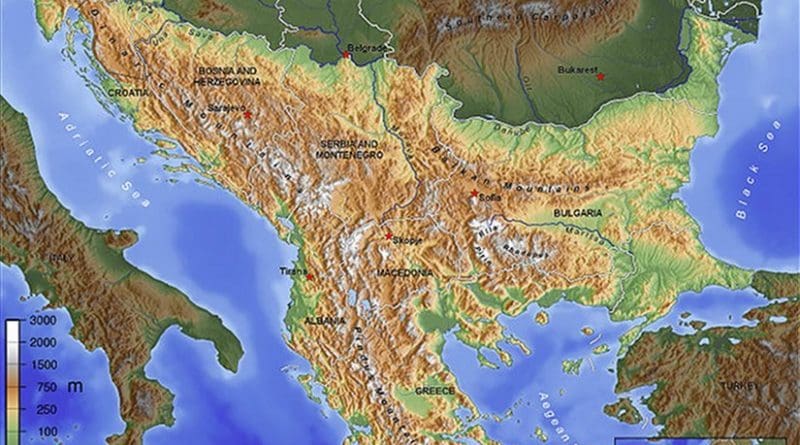EU Enlargement: Still Hope For Western Balkans? – Analysis
By Dr. Valbona Zeneli*
The European integration of the Western Balkans seems to be stuck between declarative political promises and reality on the ground. There is general consensus, both within and outside the region, that the only realistic project for achieving sustainable stability and prosperity in the Balkans is integration with the European Union (EU). Today, the completion of the “European project” for the region is threatened by serious challenges.
Europe is wrapped in its internal problems struggling to come to grip with the economic and political crises, and still shocked by Brexit, and coping with the migration crisis. Despite all of the current chaos, countries in the Western Balkans have not lost their interest in the EU, and are still queuing up to become members of this large family. On the other side, despite a recognized degree of “enlargement fatigue” by many member states, the EU is keeping the enlargement policy alive in its backyard. “Europeanizing” a region still dogged by mistrust, underdeveloped economies, weak rule of law and underrepresented civil society could be understood as a test of credibility and capacity for the EU, especially so, since winning the Nobel Peace Prize in 2012.
Enlargement fatigue
Enlargement, a core priority of the EU since the 1990s, following the fall of the Berlin Wall, has widely been acknowledged to be the most powerful instrument of EU’s foreign policy . It has been the most effective conflict prevention mechanism in the Balkans. What began as a club of six countries is now home to a population of more than 500 million. Eight more countries are waiting to join the club, while one of the most important EU countries just decided to leave – the United Kingdom.
Despite all the criticism, the overall success of enlargement is undeniable for all countries. New and old member states have benefited economically from bigger markets, higher competitiveness, and access to people and knowledge. It also contributed to reducing the east-west gap in democratic developments. While, each of the seven rounds of enlargement had different motivations and consequences due to varying geographical, political and economic characteristics of the new members, the underlying motivation has not changed: securing Europe.
Twelve years after the “historical unification” of Europe in May 2004 with the “big bang enlargement” with ten new members, the entire discourse about enlargement seems to be rather different. Popular scepticism has grown, with 53 percent of EU citizens largely opposing further enlargement .
Many argue that the “enlargement fatigue” started in 2007 with the accession of Bulgaria and Romani, when the EU reached its “absorption capacity.” But, the debate about enlargement is much older than that. In fact, it started to fade out since 2003 with the failure of the EU Constitutional process, followed by the “NO” votes of the Dutch and French referendums. Then the 2004 and 2007 enlargements increased further the diversity of the EU. On top of all this came the economic crisis and its unprecedented threat to deal a blow not just to the single market but to the whole EU. Right in the middle of the Eurozone crisis, the EU found itself unprepared for the migration crisis- the biggest security threat for Europe, and the events in East. Finally, Brexit, the most unforeseeable challenge for the union which will change the balance of power in Europe and beyond.
The European dream on
The Western Balkan states (Albania, Bosnia and Hercegovina, Macedonia, Serbia, Montenegro and Kosovo) queuing up for membership are themselves no picnic. Despite the progress made in the last 20 years, unfortunately, the region was unpleasantly eventful as the communist ideologies of the past were replaced by nationalist and ethnic divide. The quality of democracy, market economy, political management and rule of law remain concerning. Doubts are raised that democracy in the Western Balkans has turned more into power struggles, creating a gap between elites and citizens. The new institutions of market economy are undermined by the informal economy and the widening economic and social disparities. Organized crime and corruption remain serious challenges. Although the incomes per capita almost doubled in the last two decades, the Western Balkans economies lag behind the rest of Europe, with average regional levels of income as low as 36 percent of the EU countries. Integration with the EU is seen as a tool to catch up with the other advanced European countries.
However, signs of the “enlargement fatigue” are partly unsatisfactory reforms and structural difficulties in the current candidates that make it more challenging to meet the criteria for accession.
Unintended consequences
Statements of no feasible EU enlargement for the Western Balkans in the short term are not uncommon. However, overall support for the region has not been fizzling out at all. Under the initiative of Chancellor Angela Merkel, the “European Perspective” for the region was renewed in 2014, aiming to strengthen partnership and speed reforms. Success or failure will be determined by the real commitment of leaders in the region. They should miss the train this time. Friends and supporter for the region in the EU are diminishing, with the United Kingdom being a good example.
However, sending de-stimulating messages to the region for further enlargement would create the unintended consequence of “reforms fatigue.” This could foster political back-sliding and instability for the region and the EU itself.
About the author:
*Valbona Zeneli is a professor of national security studies and the director of the Black Sea Eurasia Program at the George C. Marshall European Center for Security Studies. The views presented are those of the author and do not necessarily represent views and opinions of the Department of Defense, the George C. Marshall European Center for Security Studies, or the U.S. and German Governments.
Source:
This article was published at Modern Diplomacy.

